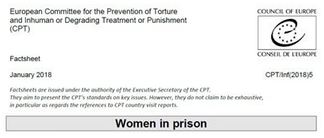Gender Stereotyping & International Human Rights Law
Извор: WUNRN – 06.06.2020
International human rights law lays down obligations which States are bound to respect. By becoming parties to international treaties, States assume obligations and duties under international law to respect, to protect and to fulfil human rights. The obligation to respect means that States must refrain from interfering with or curtailing the enjoyment of human rights. The obligation to protect requires States to protect individuals and groups against human rights abuses. The obligation to fulfil means that States must take positive action to facilitate the enjoyment of basic human rights.
https://www.ohchr.org/en/professionalinterest/pages/internationallaw.aspx
Gender Stereotyping & International Human Rights
The international human rights law framework prohibits gender stereotypes and stereotyping which undermine the enjoyment of human rights and fundamental freedoms. States have obligation to eliminate discrimination against women and men in all areas of their lives. This obligation requires States to take measures to address gender stereotypes both in public and private life as well as to refrain from stereotyping.
A gender stereotype is a generalised view or preconception about attributes or characteristics, or the roles that are or ought to be possessed by, or performed by women and men. A gender stereotype is harmful when it limits women’s and men’s capacity to develop their personal abilities, pursue their professional careers and make choices about their lives.
Harmful stereotypes can be both hostile/negative (e.g., women are irrational) or seemingly benign (e.g., women are nurturing). For example, the fact that child care responsibilities often fall exclusively on women is based on the latter stereotype.
Gender stereotyping refers to the practice of ascribing to an individual woman or man specific attributes, characteristics, or roles by reason only of her or his membership in the social group of women or men. Gender stereotyping is wrongful when it results in a violation or violations of human rights and fundamental freedoms.
Example of wrongful gender stereotyping are the failure to criminalize marital rape based on societal perception of women as the sexual property of men, and the failure to effectively investigate, prosecute and sentence sexual violence against women based on, e.g., the stereotype that women should protect themselves from sexual violence by dressing and behaving modestly.
Gender stereotypes compounded and intersecting with other stereotypes have a disproportionate negative impact on certain groups of women, such as women from minority or indigenous groups, women with disabilities, women from lower caste groups or with lower economic status, migrant women, etc.
Wrongful gender stereotyping is a frequent cause of discrimination against women and a contributing factor in violations of a vast array of rights such as the right to health, adequate standard of living, education, marriage and family relations, work, freedom of expression, freedom of movement, political participation and representation, effective remedy, and freedom from gender-based violence.
https://www.ohchr.org/EN/Issues/Women/WRGS/Pages/GenderStereotypes.aspx


